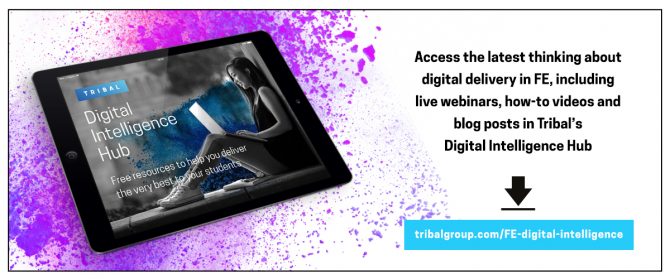With online enrolment and hybrid learning environments set to become ‘the new norm’ from September 2020, students are left wondering, will the Student Experience ever be the same again?
We asked colleges, current student cohorts, the Association of Colleges, and Blueprint Education Services for their views…
Accelerating the rate of digital change
Colleges have had to adapt quickly to new ways of working during the Covid-19 pandemic – presenting both challenges and opportunities. The pace and scale of digital reform in the FE sector in the past three months alone has been tremendous. Many colleges are now looking to ‘digital renewal’ to deliver even better enhanced learning experiences with the help of technology.
Blueprint Education Services CEO, Jason Folkett summarises the opportunity:
“Lockdown has precipitated innovative approaches to teaching and learning, which, if harnessed through the smart use of technology will bring about not only efficiency, but [also] improve retention and success.”
Kev Gillard, Associate at Association of Colleges (AoC) agrees:
“Digital strategy and practice [are] at the centre of the dialogue about curriculum intent going forwards. Learners are already ahead of us, using Instagram, Snapchat and TikTok routinely and seamlessly in their lives. Our challenge is to emulate the intuitive nature of these tools so that learner’s engagement and involvement in learning enhances their progress.”
Perhaps unsurprisingly, a recent Tribal Group customer research survey of 240 students across 4 colleges and 53 subject areas revealed a 353% increase in usage of Tribal’s app ‘Engage’, when comparing a 3-month pre- and post-lockdown average. Many students said they are now reliant on digital platforms to create their learning experience and stay connected with staff and other students:
“[The app] is helpful to me especially during this period of time where we do remote learning. Whenever we have an online lesson, my tutor drops a message in the group as a reminder. I find it really helpful.”
To build on this uptake in usage and the digital transformation of services, colleges now need to focus on re-imagining the Student Experience, especially for new starters. As having the right approach and delivery tools in place will be key to both the short and longer-term success of FE colleges everywhere, Jason Folkett (Blueprint) concludes:
“I strongly believe that those colleges that embrace technology as a key component of business success will be the ones that thrive and survive”.
Indeed, embracing technology now will reassure students that their chosen college is committed to delivering high-quality teaching digitally, dedicated to supporting their well-being via virtual services, and ready to help them achieve the best possible learning outcomes – now and in the future.
Preparing for the ‘new norm’ – trends that bode well for the FE sector
A glance at the short-term trends impacting course offerings suggests a likely increase in learners choosing to study health and nursing courses, inspired by the pandemic; although, recruitment for retail, leisure and hospitality schools will be more volatile. Longer-term, Britain’s plans for a new ‘green economy’ means that highly-rated specialist colleges are a potential source of the keyworkers and skilled tradespeople needed for this emerging sector. This is considered good news for general FE and sixth form colleges too, as they can steer learners directly into employment with the right learning support.
FE colleges may also benefit from an increase in demand for qualified vocational learners if the predicted housing boom occurs. Staying in touch with local employers will, of course, be important for colleges, particularly in ‘commuter towns’ where we’re likely to see a sudden and persistent pressure on upsizing as homeworkers move for home-office and leisure space.
In other news, there have been extensive government-level discussions around promised courses, apprenticeships, and other FE study options – particularly for those no longer seeking higher education due to circumstances brought about by the pandemic. How this will transpire remains to be seen, so FE sites will need to use their well-honed skills to pivot quickly and adapt to new policy when opportunities arise.
Whatever courses your college has to offer, recent research suggests that all students will still want ‘live’ contact with their lecturers and trainers, as this is a valuable and important part of the Student Experience.
The challenge is to accommodate this in the immediate-term, taking into consideration:
- Changes in college opening hours in response to capacity constraints on public transport
- Restricted numbers in class, on campus, and in work-place settings
- Staggered staff shifts and ‘rota’ working
- Hybrid models of ‘blended learning’ comprising face-to-face teaching in small groups and online classes
- An on-going increase in the number of learners with special educational needs and disability (SEND)
- An anticipated increase in adjustments needed following enrolment to ensure learners are on the right courses (as a result of exam cancellations)
- A possible reduction in numbers or increased shift to online learning for international students.
Many are heralding digital solutions, ideally in the cloud, as the answer to these challenges as FE colleges turn to flexible and scalable remote learning and engagement support for learners who cannot access sites consistently. Currently, demand is skyrocketing for apps, learner hubs and staff solutions that are accessible and engaging for all users.
This new technology, with correct application, also presents a transformative opportunity to bring in historically excluded learners, including blind, deaf, and non-ambulatory learners.

Five must-haves for delivering high-quality learning experiences – now and in the future
A successful digital college set-up enables back-end process to be more efficient and front-end interfaces to be more intuitive. It’s why many FE colleges are considering cloud-based CRM platforms, custom apps and other digital technologies that either provide or integrate with all the functionality the institution needs – but can be deployed ‘piece-by-piece’, as the college has the bandwidth, resources, and buy-in to add new use cases.
Jason Folkett (Blueprint) explains:
“We are starting to see the emergence of digital portfolios on learner facing Apps which link directly into CRM systems and this is exciting from an engagement and recruitment perspective. Colleges are starting to implement a ‘one stop’ approach to admissions by using collegiate onboarding systems and a more holistic approach to planning is generating sustained business efficiency.”
So what are the five key digital capabilities that all colleges need to consider in 2020 and beyond?
- Digital enrolment
Some colleges are considering digital solutions to deliver entirely remote enrolment supported by video and live chat, or a hybrid approach where only brand new starters come onto campus, and returning students re-enrol online.
For some time now, paperless enrolment processes have been gaining momentum throughout the sector and are increasingly considered best practice. Rather than learners standing in a queue for hours, using a digital enrolment solution is proven to:
- Reduce reliance on manual processes, speeding up the process wherever possible,
- Authenticate enrolment without needing face-to-face contact,
- Provide real-time visibility of the journey for each applicant,
- Deliver compliant, targeted communications to students/parents/carers,
- Report management information at every step of the process to keep staff informed, and
- Maintain a single source of highly accurate student data.
- Digital participation
Whilst attendance has gone up since offering students online learning, recent insights from FE colleges indicate that participation remains an issue. For some institutions, a way of managing this may be to deliver via online platforms only to their highest achievers, and focus in-person support for other cohorts. Kev Gillard (AoC) advocates:
“Delivering programmes efficiently by having remote attendance alongside actual attendance so that students are all studying at the same time and pace will become a way forward…”Of course, most FE colleges have already modernised teaching and learning delivery to ensure students have the materials, information and support they need for their studies, on demand and at their fingertips via virtual learning environments (VLE) and student information systems.
However, with more ‘live lessons/training’ moving online, further innovation is required to encourage participation during real-time sessions. Using polls, instant messaging and gamification features within software solutions could prove really useful in the terms ahead as teachers and students adjust to and make the most of ‘virtual’ contact time.
- Digital learning communities
As well as participation during sessions, collaboration ‘outside’ of contact time is vital for individual study, peer-to-peer learning and developing relationships that are essential for wellbeing. As face-to-face collaboration is likely to be limited (or in some cases, non-existent) for some time, collaboration apps are now a ‘must have’ for colleges that want to nurture safe, secure and personalised communication between students, staff, departments and connected businesses.Giving students a private social network in which to learn and support each other, this technology consolidates your college’s existing web portals into a single app, making access to class activities, self-learning, and social events simpler than ever before.
When asked during the aforementioned Tribal Group survey, students explained the benefit they get from their college’s collaboration app:
“I like being able to see all updates about the college and current events that are happening as well as messaging my friends, my tutor when needed, plus seeing my timetable and all of my course progression.”
“[I can] chat to friends privately, post pictures and literally do anything. It’s like Twitter, Facebook and Instagram all in one but based on college friends so I can get information from others on my course.”
What’s more, these apps can be directly linked to supporting students’ mental health, as this respondent summarised:
“I’ve used the app for contacting my tutor while struggling with mental health issues. Additionally, with the Coronavirus, it’s been a way to check up on the status [of my classes].”
- Digital student wellbeing and support
As the previous point indicates, all FE colleges are anticipating an increased pressure on pastoral and welfare services and are busy preparing support for bereaved learners and those who have suffered illness. Colleges with older and adult learners are also conducting risk assessments around tiredness, travel and sensitivity to further infections.
Post-Brexit, pastoral teams can also expect an increase in the number of questions regarding right to study, student finance, and finding work. Keeping your college’s FAQs up to date and as detailed as possible will prove a welcome source of reassurance for both existing and potential international students.
Indeed, ensuring your Student Wellbeing services can be accessed digitally and students can find the support they need, when they need it 24/7 365, has never been more important – for student welfare, and for retention.
- Digital insights
A typical student now has many ‘touch-points’ with their college – including library records, tutorial log-ins, and sessions spent accessing virtual course-ware. With more and more of these touch-points now becoming digital, the capability to monitor them is increasing daily. Using intelligent software to analyse these growing data sets, educators can identify students who are struggling – and even predict who is likely to drop-out – so that they can stage targeted ‘interventions’ in time to make a difference, rather than months downstream of the issue.
Once at risk of ‘drowning in data’, now colleges have the power to combine ‘learning analytics’ with predictive analytics, student service usage, business intelligence, and financial performance, in order to increase efficiencies and improve student engagement and success.
Indeed, studying your data trends now could help shape the rest of your digital transformation journey as you re-imagine the Student Experience at your college.
Blueprint’s Jason Folkett concludes:
“An ‘end to end’ business intelligence approach enables colleges to plan and respond with agility in an informed and measured way… In our experience colleges with fully integrated business systems are best placed to respond to the challenges and opportunities that the future holds for the sector.”
For more ways to ‘re-imagine’ the Student Experience and enable your business to respond to market changes with agility, take a look at Tribal’s FE Digital Intelligence Hub. There you can access video resources, sign up for live webinars on topics like enrolment, and access a wealth of resources to support your transition to a digital focus.

















Your thoughts